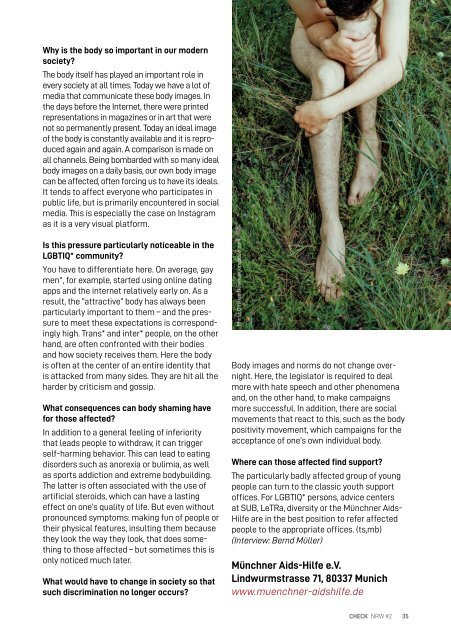CHECK NRW #2
- Keine Tags gefunden...
Sie wollen auch ein ePaper? Erhöhen Sie die Reichweite Ihrer Titel.
YUMPU macht aus Druck-PDFs automatisch weboptimierte ePaper, die Google liebt.
Why is the body so important in our modern<br />
society?<br />
The body itself has played an important role in<br />
every society at all times. Today we have a lot of<br />
media that communicate these body images. In<br />
the days before the Internet, there were printed<br />
representations in magazines or in art that were<br />
not so permanently present. Today an ideal image<br />
of the body is constantly available and it is reproduced<br />
again and again. A comparison is made on<br />
all channels. Being bombarded with so many ideal<br />
body images on a daily basis, our own body image<br />
can be affected, often forcing us to have its ideals.<br />
It tends to affect everyone who participates in<br />
public life, but is primarily encountered in social<br />
media. This is especially the case on Instagram<br />
as it is a very visual platform.<br />
Is this pressure particularly noticeable in the<br />
LGBTIQ* community?<br />
You have to differentiate here. On average, gay<br />
men*, for example, started using online dating<br />
apps and the internet relatively early on. As a<br />
result, the “attractive” body has always been<br />
particularly important to them – and the pressure<br />
to meet these expectations is correspondingly<br />
high. Trans* and inter* people, on the other<br />
hand, are often confronted with their bodies<br />
and how society receives them. Here the body<br />
is often at the center of an entire identity that<br />
is attacked from many sides. They are hit all the<br />
harder by criticism and gossip.<br />
What consequences can body shaming have<br />
for those affected?<br />
In addition to a general feeling of inferiority<br />
that leads people to withdraw, it can trigger<br />
self-harming behavior. This can lead to eating<br />
disorders such as anorexia or bulimia, as well<br />
as sports addiction and extreme bodybuilding.<br />
The latter is often associated with the use of<br />
artificial steroids, which can have a lasting<br />
effect on one’s quality of life. But even without<br />
pronounced symptoms: making fun of people or<br />
their physical features, insulting them because<br />
they look the way they look, that does something<br />
to those affected – but sometimes this is<br />
only noticed much later.<br />
What would have to change in society so that<br />
such discrimination no longer occurs?<br />
Photo: Cristian Newman_unsplash.com<br />
Body images and norms do not change overnight.<br />
Here, the legislator is required to deal<br />
more with hate speech and other phenomena<br />
and, on the other hand, to make campaigns<br />
more successful. In addition, there are social<br />
movements that react to this, such as the body<br />
positivity movement, which campaigns for the<br />
acceptance of one’s own individual body.<br />
Where can those affected find support?<br />
The particularly badly affected group of young<br />
people can turn to the classic youth support<br />
offices. For LGBTIQ* persons, advice centers<br />
at SUB, LeTRa, diversity or the Münchner Aids-<br />
Hilfe are in the best position to refer affected<br />
people to the appropriate offices. (ts,mb)<br />
(Interview: Bernd Müller)<br />
Münchner Aids-Hilfe e.V.<br />
Lindwurmstrasse 71, 80337 Munich<br />
www.muenchner-aidshilfe.de<br />
<strong>CHECK</strong> <strong>NRW</strong> <strong>#2</strong><br />
35


















